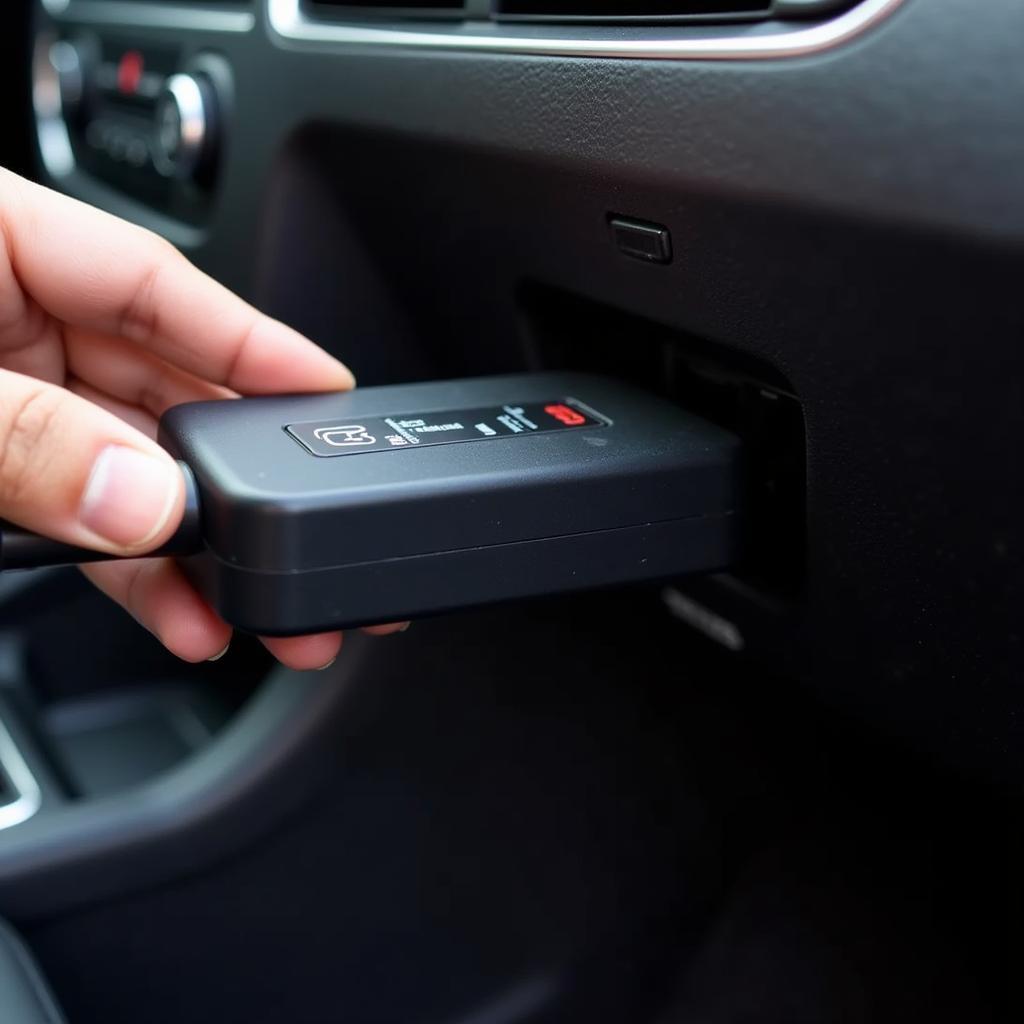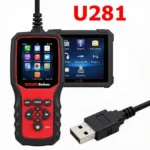A diagnostics car checker is an essential tool for anyone who owns, operates, or services vehicles. Whether you’re a seasoned mechanic or a car enthusiast, understanding how to use a diagnostics car checker can save you time, money, and frustration. This comprehensive guide will delve into the world of diagnostics car checkers, exploring their functionalities, benefits, and how they empower you to take control of your vehicle’s health.
What is a Diagnostics Car Checker?
A diagnostics car checker, often referred to as an OBD2 scanner or code reader, is a device that connects to your vehicle’s onboard computer system. This system, known as the On-Board Diagnostics (OBD) system, continuously monitors various components and systems within your car. When the OBD system detects a problem, it generates a Diagnostic Trouble Code (DTC), which is essentially a code that corresponds to the specific issue.
A diagnostics car checker allows you to retrieve and interpret these DTCs, providing valuable insights into the potential causes of your car’s problems. Think of it as a window into your car’s brain, giving you the ability to understand what’s going on under the hood.
Why Use a Diagnostics Car Checker?
Using a diagnostics car checker offers numerous advantages:
- Early Problem Detection: By identifying issues early on, you can address them before they escalate into major (and costly) repairs.
- Accurate Diagnosis: Eliminate guesswork and get straight to the root of the problem, avoiding unnecessary repairs.
- Cost Savings: Avoid expensive mechanic visits by diagnosing and potentially fixing simple issues yourself.
- Increased Control: Take charge of your vehicle’s maintenance and gain a deeper understanding of its health.
- Improved Performance: Identify and resolve performance-related issues, potentially improving fuel efficiency and overall performance.
Types of Diagnostics Car Checkers
Diagnostics car checkers are available in a wide range of options, from basic code readers to advanced professional-grade scanners.
- Basic Code Readers: These affordable and easy-to-use devices are ideal for retrieving and clearing basic DTCs.
- Mid-Range Scanners: Offer more advanced features such as live data streaming, allowing you to monitor sensor readings in real time.
- Professional-Grade Scanners: Provide comprehensive functionalities, including advanced diagnostics, programming capabilities, and access to manufacturer-specific codes.
Choosing the right diagnostics car checker depends on your individual needs and budget.
How to Use a Diagnostics Car Checker
Using a diagnostics car checker is generally straightforward:
- Locate Your Vehicle’s OBD2 Port: Usually located under the dashboard on the driver’s side.
- Connect the Diagnostics Car Checker: Plug the device into the OBD2 port.
- Turn on Your Vehicle’s Ignition: Do not start the engine.
- Follow On-Screen Instructions: The device will guide you through the process of retrieving and interpreting DTCs.
Understanding Diagnostic Trouble Codes (DTCs)
DTCs consist of a five-digit alphanumeric code. Each code corresponds to a specific issue within the vehicle’s system. For example, a code like “P0301” indicates a misfire in cylinder number one.
While a diagnostics car checker can help you retrieve DTCs, it’s important to remember that these codes provide a starting point for diagnosis. Further investigation and troubleshooting are often required to pinpoint the exact cause of the problem.
Beyond Basic Code Reading: Advanced Features
Many diagnostics car checkers offer additional features that provide even deeper insights into your vehicle’s performance:
- Live Data Streaming: Monitor sensor readings in real time, such as engine RPM, coolant temperature, and oxygen sensor readings. This data can be invaluable for diagnosing intermittent problems and monitoring overall vehicle health.
- Freeze Frame Data: Capture a snapshot of sensor readings at the moment a DTC was triggered, providing valuable clues about the circumstances surrounding the issue.
- Component Testing: Some devices allow you to perform basic component tests, such as activating solenoids or injectors. This can help isolate faulty components and verify repairs.
Choosing the Right Diagnostics Car Checker
With a plethora of options available, choosing the right diagnostics car checker can seem daunting. Consider these factors:
- Your Vehicle’s Make and Model: Some devices are designed for specific makes and models, offering enhanced functionalities and access to manufacturer-specific codes.
- Your Skill Level: If you’re a beginner, a basic code reader might be sufficient. More experienced users might prefer mid-range or professional-grade scanners with advanced features.
- Your Budget: Diagnostics car checkers range in price from affordable to expensive. Determine your budget and choose a device that offers the best value for your needs.
Conclusion
A diagnostics car checker is an invaluable tool for any car owner or enthusiast. From early problem detection to accurate diagnosis and potential cost savings, the benefits are numerous. By understanding how to use a diagnostics car checker and interpret the information it provides, you can empower yourself to take control of your vehicle’s maintenance and ensure its optimal performance. To explore a comprehensive range of diagnostics car checkers and find the perfect one for your needs, visit car diagnostic checker.
FAQs
1. Can I use any diagnostics car checker on my vehicle?
While most vehicles manufactured after 1996 use the standard OBD2 protocol, it’s essential to ensure compatibility with your specific make and model.
2. Will a diagnostics car checker clear the check engine light?
Yes, most diagnostics car checkers allow you to clear DTCs and reset the check engine light. However, keep in mind that the light will return if the underlying problem is not addressed.
3. Can a diagnostics car checker tell me exactly what’s wrong with my car?
Diagnostics car checkers provide valuable clues but don’t always pinpoint the exact cause of a problem. Further investigation and troubleshooting are often required.
4. Is it worth buying a diagnostics car checker if I’m not mechanically inclined?
Even if you’re not a mechanic, a basic code reader can still be helpful for understanding basic problems and avoiding unnecessary mechanic visits.
5. What should I do if I’m unable to diagnose the problem using a diagnostics car checker?
If you’re unable to resolve the issue yourself, it’s best to consult a qualified mechanic for further diagnosis and repair.
Common Car Diagnostic Scenarios
Here are some typical situations where a diagnostics car checker proves invaluable:
- Check Engine Light Illumination: The most common reason people use a diagnostics car checker.
- Engine Misfires: Detect misfires in specific cylinders to determine the root cause, such as faulty spark plugs or ignition coils.
- Emissions Issues: Identify problems with the emissions system, including faulty oxygen sensors or catalytic converters.
- Transmission Problems: Diagnose issues with the transmission control module or other transmission components.
- ABS and Airbag System Faults: Retrieve DTCs related to ABS and airbag systems to address safety concerns.
Explore More Car Diagnostic Resources
For further information and resources on car diagnostics, check out these helpful links:
- Check Car Diagnostic: Learn more about the importance of regular car diagnostics.
- All Car Diagnostic Tool Coding: Delve into the world of car diagnostic tool coding and their significance.
Need Car Diagnostic Support?
DiagFixPro is here to help! If you have any questions or need assistance with car diagnostics, don’t hesitate to contact us.
Contact Us:
- WhatsApp: +1(641)206-8880
- Email: [email protected]
Our dedicated customer support team is available 24/7 to assist you.


